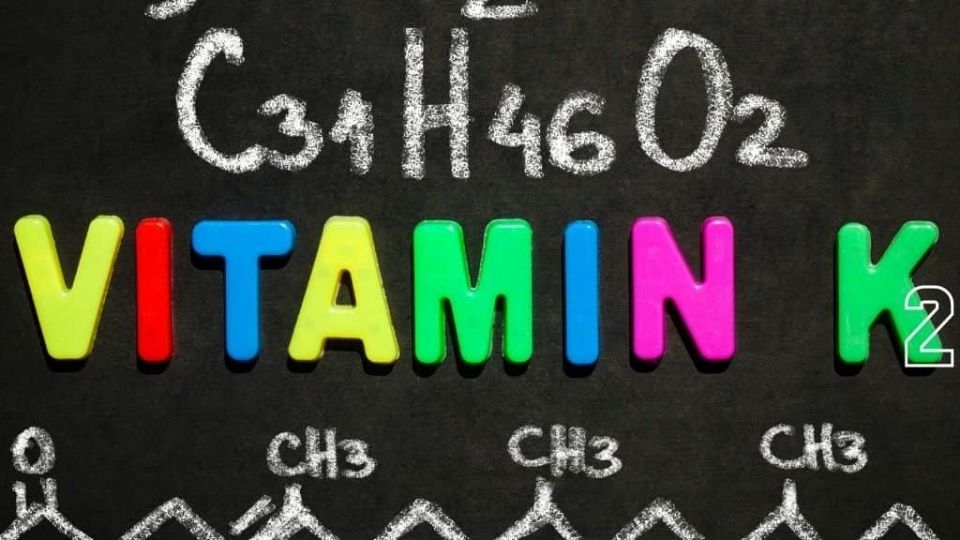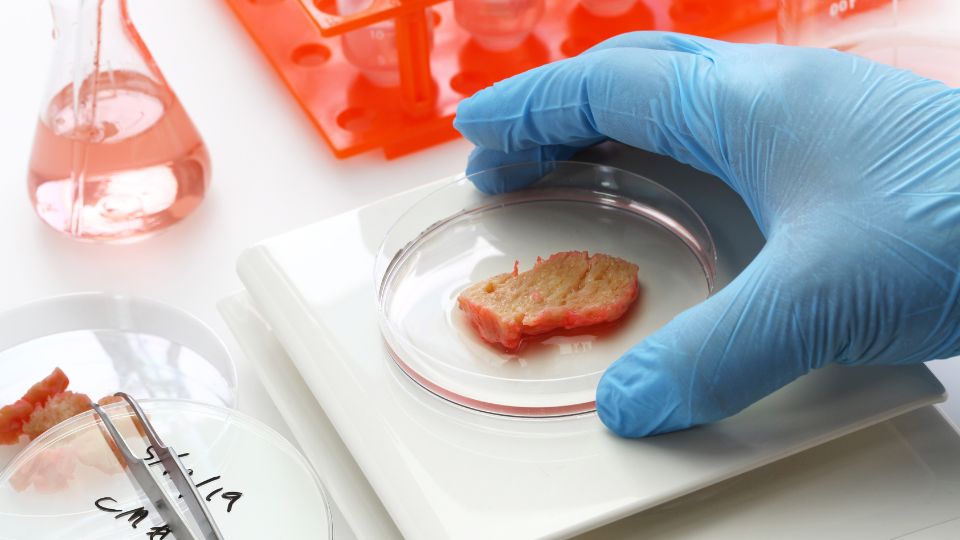Vitamin K is an essential nutrient for blood coagulation (blood clotting) and is responsible for helping protein and calcium work in harmony within our bodies. There are two types of Vitamin K: Vitamin K1 and Vitamin K2.
Vitamin K1(phylloquinone) is mainly found in plant foods such as leafy greens. In contrast, Vitamin K2 (menaquinone) is found mainly in animal products and fermented foods such as pork, foie gras, beef, egg yolks, sauerkraut, and dairy products.
Not all forms of Vitamin K2 are created equal, with the two most commercialized forms MK-4 and MK-7 having different effects. Due to the longer half-life of the side chain of MK-7, it is granted enough time to access tissues beyond the liver.
New Vitamin K-2 MK-7 clinical trials for the cardio-vascular treatment
Although Vitamin K’s health benefits are undisputed, this vitamin is rare in the Western diet and does not receive as much attention as it should. The success of vitamin K2 to combat osteoporosis and type 2 diabetes has led researchers to investigate the other benefits of the nutrient, specifically cardiovascular health, and treatment.
Several clinical trials have been done to investigate the effect of vitamin K2 on common cardiovascular conditions in various individuals.
Vitamin K-2 and Vascular Calcification
Heart Disease and cardiovascular complications are the leading cause of death in the world.
The buildup of calcium in the arteries, large and small blood vessels, and the heart, also known as arterial calcification, contribute to the onset of many common cardiovascular diseases such as hypertension, coronary artery disease, high blood pressure, ischemia, and brain damage.
Many studies are underway on the effects of Vitamin K2 on cardiovascular disease to combat this category of disease.
Promising Results
A recent study published by Vascular Diseases and Therapeutics in July 2020 showed promising results with a positive correlation between Vitamin K2 (MK-7) intake and prevention of arterial calcification. Arterial calcification is extremely common and seen in most adults sixty years or older.
The condition reduces arterial elasticity, leading to an increased risk of cardiovascular failure in the body and the brain. The study was characterized by a group of insufficient vitamin K men and women who were given a nutritional supplement of Mena Q7 Vitamin K2 MK-7 once every day for a year.
The study consisted of 243 subjects (40-70 years old) with treatment performed with either 180 µg/day of Vitamin K2 as MK-7 for one year or a placebo for one year.
Carotid-femoral Pulse-wave Velocity
Participants’ arterial stiffness was measured using the carotid-femoral pulse-wave velocity (cfPWV), and other vascular characteristics were measured using echo tracking of the common carotid artery.
Matrix Gla-Protein (MGP), a protein involved in preventing arterial calcification, was measured in the participants’ bodies. During vitamin K insufficiency, an inactive form of MGP (dp-ucMGP) is produced. In the total study group, MK-7 led to a significant decrease in dp-cuMGP and cfPW.
Insufficient Vitamin K levels
The effects of the study were most prevalent in women with insufficient vitamin K levels after one year of treatment. Their level of dp-ucMGP decreased from 639-450 pmol/L.
Women also responded more favorably regarding cardiovascular characteristics with a decrease in carotid artery diameter, intima-media thickness, and distension, all factors related to measuring the risk and extent of cardiovascular disease.
A lower diameter, IMT, and distention are all associated with decreased risk for cardiovascular disease. The researchers in the study concluded that high vitamin K intake decreased age-related cardiovascular stiffening.
Populations with a diet rich in K2
Hogme Vik, Natto Pharma Chief Medical Officer, comments on how these results mirror previous epidemiological studies, as populations with a diet rich in K2 have healthier hearts and more flexible arteries.
In the French case, their diets are richer in foie gras and liver, which are seen as fatty and unhealthy. However, the high concentration of vitamin K-2 in these foods may overshadow the health risks professionals have seen previously.
Vitamin K-2 Long-Term Effects
Another main topic of investigation in studying Vitamin K2 supplementation is the number of times supplements need to be taken. A clinical trial focusing on Vitamin K2 (MK-7) treatment of patients with diabetes metalates 2, wanted to investigate the short-term effects of a supplement.
The trial ran for only 6 months and tracked the bone mineral density and the systematic arterial calcification of each patient. The study included a randomized trial of 68 participants, each with high arterial calcification and low Vitamin K levels at the start of the trial.
Progression of Arterial Calcification
The study results showed that only six months of Vitamin K supplementation did not halt the progression of arterial calcification and did not decline bone mass density in patients. These findings are important as they show that Vitamin K supplementation is a process and takes time to affect positively. Vitamin K-deficient people will not see positive results in 6 months.
Doctors should recommend earlier supplementation to reduce the risk of losing bone mass density and prevent cardiovascular disease. Other studies have shown the positive effects of MK-7 over at least a one-year period.
Positive Effects?
While there is strong evidence to suggest the positive effects of long-term vitamin K2 supplementation on arterial calcification, the patients in those studies did not suffer from any additional major health conditions.
The proportion of adults with at least one major health condition worldwide ranges from 45% in China to 71% in Russia. The effects of Vitamin K2 on patients with other health conditions have not been a major topic of study.
A recent study done by RenaKvit focused on the cardiovascular effects of patients with dialysis after Vitamin K supplementation. Since dialysis patients are at an increased risk of morbidity associated with arterial calcification, the effects of Vitamin K were studied to see if they improved this at-risk population.
Placebo-controlled intervention trial
The study was a two-year, double-blind, placebo-controlled intervention trial in which 48 dialysis patients were randomized to vitamin K2 supplement or placebo treatment. The amount of MK7 taken was double the amount in the Vascular Diseases and Therapeutics study, with each patient taking 360 micrograms daily.
However, contrary to the results of the previous studies, MK7 did not have any significant effect on arterial calcification for dialysis patients. An explanation for this can be due to the abnormal immune function of dialysis patients.
Although it is unfortunate that the effects of Vitamin K2 on the heart are not seen in dialysis patients, the study is an important step in discovering the full impact of Vitamin K2 on cardiovascular health.
Effects of Vitamin K-2 on Patients with Chronic Kidney Disease
Another study investigated the effects of Vitamin K2 on low levels of Vitamin K and non-dialyzed patients with chronic kidney disease on vascular calcification and atherosclerosis. Atherosclerosis is another extremely common disease affecting 3 million adults each year.
Patients with atherosclerosis have a buildup of plaque in the walls of the arteries causing obstruction of blood flow that can eventually lead to the development of cardiovascular disease if the plaque buildup manifests in heart arteries.
Studies result
The study included 42 non-dialyzed patients with chronic kidney disease (CKD). A supplemental dose of 90 micrograms of vitamin K2 was administered to patients with 10 micrograms of Cholecalciferol.
The study chose to include a cholecalciferol supplement (vitamin D3), which aids in calcium retention in the body. In conjunction with vitamin K2, Cholecalciferol helps absorb calcium, which leads to strong bones and less calcium being deposited in the arteries, decreasing the risk of vascular calcification and other heart conditions.
The 270-day course
The study results showed significant evidence that a 270-day course of vitamin K2 administration in patients with CKD stages 3-5 may reduce the progression of atherosclerosis but does not significantly affect calcification progression.
Within the treatment group of patients, the increase of common carotid intermedia thickness was less than that of the placebo group with 0.95+/- 0.2 mm to 1.01+/- 0.3mm versus from 1.02+/- 0.2mm to 1.16+/- 0.3mm in the placebo group.
These results give further evidence of Vitamin K2’s significant effects on our arteries. While the study results do not specifically show improvement in arterial calcification, they are promising to reduce the risk of another common arterial condition.
Beware
Since the cardiovascular system is complex and intertwined, plaque buildup in the arteries is a serious health risk that often leads to cardiovascular disease and failure. The supplementation of MK7 is promising in relieving some of these causes of cardiovascular disease, even if the supplement is not always directly affecting the patient’s heart.
These new studies are extremely important for the future of the biotech industry. By creating supplements containing Vitamin K2, the number of health conditions related to cardiovascular disease, specifically vascular calcification, can decrease.
In Conclusion
Cardiovascular Disease is the leading cause of death in the world. By studying different drugs and methods to prevent the disease, many lives are being not only extended but potentially saved. Vitamin K2 is a promising therapy to alleviate and hopefully, one day eliminate cardiovascular disease.








